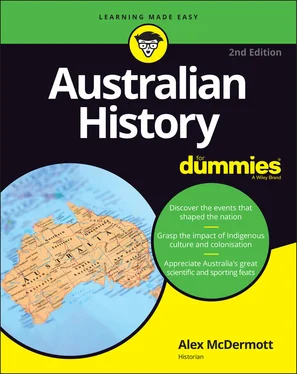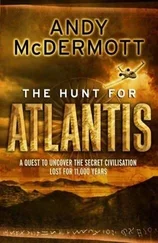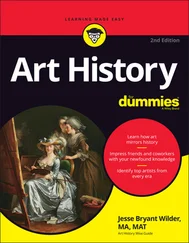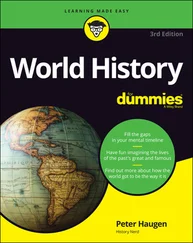 The convicts who arrived on the First Fleet weren’t left to die — the Governor couldn’t let that happen to convict settlers he’d been charged with looking after (and the convicts knew it) — but starvation did become a real threat. In 1789, a British ship en route to the colony with supplies struck an iceberg and sank. The great risks involved with establishing a settlement in a remote part of the world with no pre-existing shipping or trade routes became more and more apparent with each passing day as famine loomed. By early 1790, the colony’s supplies had dwindled alarmingly.
The convicts who arrived on the First Fleet weren’t left to die — the Governor couldn’t let that happen to convict settlers he’d been charged with looking after (and the convicts knew it) — but starvation did become a real threat. In 1789, a British ship en route to the colony with supplies struck an iceberg and sank. The great risks involved with establishing a settlement in a remote part of the world with no pre-existing shipping or trade routes became more and more apparent with each passing day as famine loomed. By early 1790, the colony’s supplies had dwindled alarmingly.
In addition to the difficulties with the criminals and the marines, the ground Phillip was trying to grow crops on proved to be largely barren and infertile. But Phillip showed his mettle, and his genius for combining real fairness with great toughness. A man who’d been living on and commanding ships for much of his life, he was used to the world of rough equality that prevailed on ships. This world was often brutal, but on the ship everyone knew they had no-one else to rely on outside their fellow crew, whatever their rank may be. This same logic applied now and Phillip followed it ruthlessly.
Phillip declared that all rations would be divided equally, no matter if you were free or felon. The officers, again, were outraged, but Phillip, again, ignored them. Then he showed the same impartiality with executions. Stealing provisions was made a capital offence. In the year of their arrival, he’d shown this by hanging convicts who stole supplies. He then followed it up in 1789 by hanging soldiers who were caught running a scam of pilfering the main store. No-one could be under any illusions now as to how things stood.
The first two years of settlement were no picnic, and 1790 wasn’t much better. The Second Fleet, which arrived in June 1790, wasn’t able to do much to help NSW out of near-starvation, because many of the new arrivals were on death’s door by the time they arrived. Meanwhile the Indigenous Australians had to deal with an invasion of overwhelming numbers into their country.
By the time the Second Fleet arrived in June 1790, a quarter of the settlement had died. But the fleet itself, while carrying supplies, brought with them a human disaster. While the First Fleet had been well planned and supervised, the second was a story of neglect, brutality and deliberate starvation. The job of transporting the convicts had been given to private contractors, whose usual cargo was African slaves. Slaves fared slightly better, however, because with slaves came the incentive for those in charge to keep as many as possible alive to sell at the other end of the journey. Here, however, no such rule applied and the more who died, the easier the contractors’ job got.
Of the 750 convicts who actually made it to NSW, 500 were hospital cases, and the half-starved colony set to work putting up emergency hospital tents. When news got back to London, a scandal erupted, and a trial of the contractors was held. (The contractors got off.) The outcry meant that even though convicts were being transported out of sight, they weren’t completely out of mind. In future, more rigorous regulations and official supervision would ensure the vast majority transported arrived alive and in reasonable health.
 HORROR SCENES ON THE BOATS
HORROR SCENES ON THE BOATS
The colony’s parson, Reverend Johnson, described the apocalyptic scene when the Second Fleet pulled into what would become Sydney Harbour, with people throwing the bodies of those who’d just died overboard. The bodies floated in on the tide in front of the ships, and came to rest on the rocks. On shore many of the convicts being unloaded were so weak they couldn’t walk: ‘Some creeped upon their hands and knees, and some were carried upon the backs of others’.
Going on board one of the ships, Reverend Johnson found ‘a sight truly shocking to the feelings of humanity, a great number of them lying, some half and others nearly quite naked, without either bed or bedding, unable to turn or help themselves’.
Courting disaster with the interlopers
The local Eora and Darug people had pragmatically tried to adjust to the invasion, as fear and curiosity mingled on either side of the massive cultural divide. To begin with at least, relations were more cordial than hostile. Many of the marine officers were fascinated with these people from a completely ‘new’ and previously unknown culture. The Indigenous Australians mostly got along with the officers — the young warrior men especially.
 With convicts, however, relations between black and white quickly soured. Quite early on — in May 1788 — two young convicts, William Okey and Samuel Davis, were killed while cutting grass at a place now known as Rushcutters Bay to make a thatch roof for the Store House. The killings were gruesome — the bodies described as ‘jellied’ — and while their clothes and provisions were untouched, their rush-cutting tools were taken. The exact cause of the death of these two was difficult to establish, but the settlement’s surgeon, John White, suspected that ‘from the civility shown on all occasions to the officers by the natives, whenever any of them were met, I am strongly inclined to think that they must have been provoked and injured by the convicts’. Phillip thought likewise.
With convicts, however, relations between black and white quickly soured. Quite early on — in May 1788 — two young convicts, William Okey and Samuel Davis, were killed while cutting grass at a place now known as Rushcutters Bay to make a thatch roof for the Store House. The killings were gruesome — the bodies described as ‘jellied’ — and while their clothes and provisions were untouched, their rush-cutting tools were taken. The exact cause of the death of these two was difficult to establish, but the settlement’s surgeon, John White, suspected that ‘from the civility shown on all occasions to the officers by the natives, whenever any of them were met, I am strongly inclined to think that they must have been provoked and injured by the convicts’. Phillip thought likewise.
Indigenous–convict relations continued to degenerate. Aboriginal Australians, prizing warrior prowess and with a keen eye for status and prestige, largely enjoyed the company of First Fleet officers, who were for their part more curious and respectful than hostile. Convicts and Aboriginals, however, despised each other. Mutual distrust reigned, and thefts, rape and payback killings began to increase.
But the convicts themselves weren’t the great fracturing event. A year after the killings at Rushcutters Bay, a smallpox epidemic struck the settlement. Most of the white settlers had already established immunity to the disease, but the effect on Indigenous Australians was devastating. Some 50 per cent of Aboriginal people in the Sydney region died as a consequence.
 This, as much as the Rushcutters Bay deaths, was to be the tragic signature tune for the encounter between British and Indigenous societies as settlement spread outward. However many Aboriginal people died as a result of direct conflict with the white invaders and targeted killings — and plenty did — the impact of epidemic diseases, to which they had no established immunity, was far more devastating. Combined with the effect of a brand new intoxicant — alcohol — the consequences of white settlement were profound.
This, as much as the Rushcutters Bay deaths, was to be the tragic signature tune for the encounter between British and Indigenous societies as settlement spread outward. However many Aboriginal people died as a result of direct conflict with the white invaders and targeted killings — and plenty did — the impact of epidemic diseases, to which they had no established immunity, was far more devastating. Combined with the effect of a brand new intoxicant — alcohol — the consequences of white settlement were profound.
One of the Eora leaders, a man named Bennelong, developed a unique relationship with Governor Phillip — which is pretty amazing, because he started out by being kidnapped, on Governor Phillip’s direct orders, in November 1789.
Phillip really wanted to learn the local Aboriginal languages and get a better sense of the local customs. Essentially, he wanted to find out how he could discuss and negotiate, and, well, let’s just say that that moment in the meeting where someone points out, ‘Kidnapping people to initiate good relations with the neighbours is actually a really, incredibly stupid idea, sir’ just didn’t happen that day. The instructions from the British Government were to live harmoniously with the local tribes, and to get to know them as well. And abduction … just seemed to be the way to go about realising those aims.
Читать дальше

 The convicts who arrived on the First Fleet weren’t left to die — the Governor couldn’t let that happen to convict settlers he’d been charged with looking after (and the convicts knew it) — but starvation did become a real threat. In 1789, a British ship en route to the colony with supplies struck an iceberg and sank. The great risks involved with establishing a settlement in a remote part of the world with no pre-existing shipping or trade routes became more and more apparent with each passing day as famine loomed. By early 1790, the colony’s supplies had dwindled alarmingly.
The convicts who arrived on the First Fleet weren’t left to die — the Governor couldn’t let that happen to convict settlers he’d been charged with looking after (and the convicts knew it) — but starvation did become a real threat. In 1789, a British ship en route to the colony with supplies struck an iceberg and sank. The great risks involved with establishing a settlement in a remote part of the world with no pre-existing shipping or trade routes became more and more apparent with each passing day as famine loomed. By early 1790, the colony’s supplies had dwindled alarmingly. HORROR SCENES ON THE BOATS
HORROR SCENES ON THE BOATS With convicts, however, relations between black and white quickly soured. Quite early on — in May 1788 — two young convicts, William Okey and Samuel Davis, were killed while cutting grass at a place now known as Rushcutters Bay to make a thatch roof for the Store House. The killings were gruesome — the bodies described as ‘jellied’ — and while their clothes and provisions were untouched, their rush-cutting tools were taken. The exact cause of the death of these two was difficult to establish, but the settlement’s surgeon, John White, suspected that ‘from the civility shown on all occasions to the officers by the natives, whenever any of them were met, I am strongly inclined to think that they must have been provoked and injured by the convicts’. Phillip thought likewise.
With convicts, however, relations between black and white quickly soured. Quite early on — in May 1788 — two young convicts, William Okey and Samuel Davis, were killed while cutting grass at a place now known as Rushcutters Bay to make a thatch roof for the Store House. The killings were gruesome — the bodies described as ‘jellied’ — and while their clothes and provisions were untouched, their rush-cutting tools were taken. The exact cause of the death of these two was difficult to establish, but the settlement’s surgeon, John White, suspected that ‘from the civility shown on all occasions to the officers by the natives, whenever any of them were met, I am strongly inclined to think that they must have been provoked and injured by the convicts’. Phillip thought likewise.










